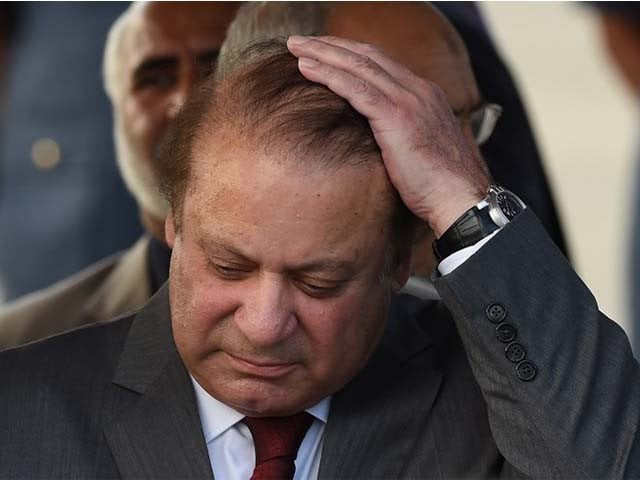Nawaz challenges trial court order in IHC
Says no basis for concurrent decisions on references

PHOTO: AFP/FILE
Filing the petition against the order of June 5, his counsel Khawaja Haris asserted that instead of quick disposal, delaying all three references was the option left to Accountability Court Judge Muhammad Bashir.
Subsequently, IHC’s division bench comprising Justice Aamer Farooq and Justice Mohsin Akhtar Kayani heard the petition on Thursday and served notice on NAB.
Deviating from its earlier stance that all three corruption references filed by the National Accountability Bureau (NAB) against the Sharif family would be decided simultaneously, the accountability court held on June 5 that no such reason existed now.
“The accused has not produced any defence witness in this [Avenfield] reference. He has also not opted to be examined under oath (in the light of) Section 340 (2) CrPC. Therefore, the reason for rendering decision simultaneously on all three references does not exist at present,” Judge Bashir stated in the order.
Subsequently, the court dismissed Sharif’s request to postpone final arguments till evidence was recorded in all three references and NAB prosecutors presented their final arguments against Sharif, Maryam Nawaz and Capt (retd) Safdar as well as Sharif’s sons, Hassan Nawaz and Hussain Nawaz, who are still absconding, in the Avenfield Apartments reference.
If the accountability court decides one of the three references separately of the other two, the counsel stated, the judge would already have disclosed his mind with regard to not only the accused, common in all three references, but also in respect to facts which are common to all three cases.
If the court goes ahead, he stated, it would be obliged to stay its hand from deciding the other two references as a matter of propriety, equity and fair play.
Consequently, he continued, the other two references would inevitably be transferred to and decided by one or more judges who would be totally unfamiliar with facts and legal propositions involved in these cases.
Accordingly, he said, the decision of the other two references would take considerably more time than if all three are decided together.
All references had at least 60 per cent of factual propositions and 90 per cent of legal propositions which are common to them,” Haris stated in the petition.
He stated that hearing of arguments and deciding all three references together would save considerable time while deciding the references separately would entail decisions by three separate judges and take three times more time.
Even the implementation bench of the Supreme Court in the Panamagate trial, Haris said, had ruled that decision within stipulated time “does not mean that the right to fair trial of the accused should be compromised in any manner”.
Moreover, he said, the procedure of deciding one reference while postponing proceedings in the other two references was not in accord with the letter and spirit of the Supreme Court order which envisaged decision on all references within the time-frame given by it and not on one reference only.
In the petition, Haris pointed out that Judge Bashir had categorically held on November 8, 2017 that all three references should be decided together, adding that the judge had again reiterated this on March 2, 2018.
In the November 8, 2017 order Judge Bashir had observed that “in order to avoid conflicting judgments, or any likelihood of ignoring any defence that will be produced by the applicant/accused in each reference, all the three references shall be decided simultaneously.”
On June 5, Sharif’s counsel had requested the accountability court to postpone final arguments until NAB’s witnesses, JIT head Wajid Zia and two investigation officers in Al-Azizia & Hill Metal and Flagship references, record statement and are cross examined.
Stressing the need for deciding all three references simultaneously, the counsel had maintained that it did not suit the court to decide any one reference separately and independently of the other two references without recalling any of its earlier orders or rulings.
Previously, the court had adjourned the hearing of Al-Azizia reference wherein Zia is being cross-examined till June 11 and directed NAB and the defence counsel to present arguments in the Avenfield Apartments’ reference.
During the past three hearings, the NAB’s prosecutor presented arguments in the London flats reference. He would continue on Friday.

1675249047-0/image-(18)1675249047-0-208x130.webp)

















COMMENTS
Comments are moderated and generally will be posted if they are on-topic and not abusive.
For more information, please see our Comments FAQ